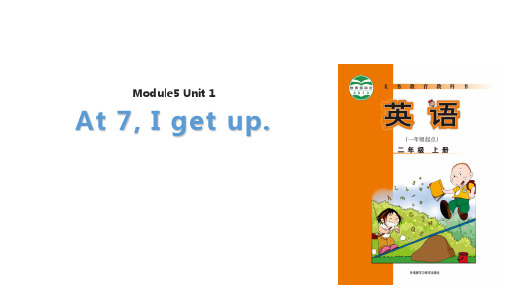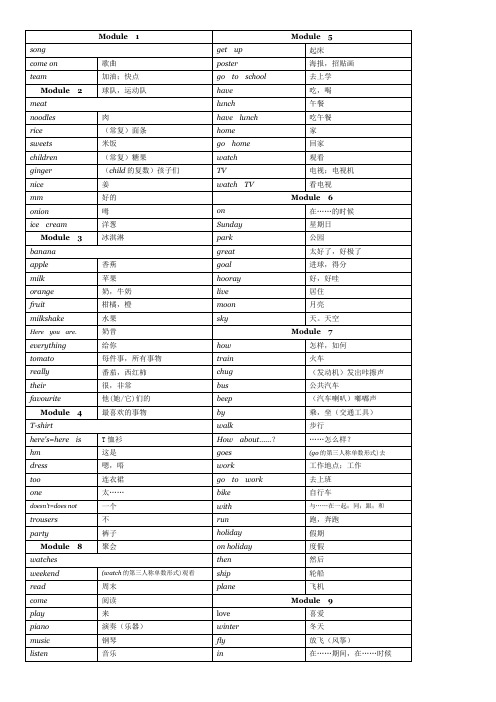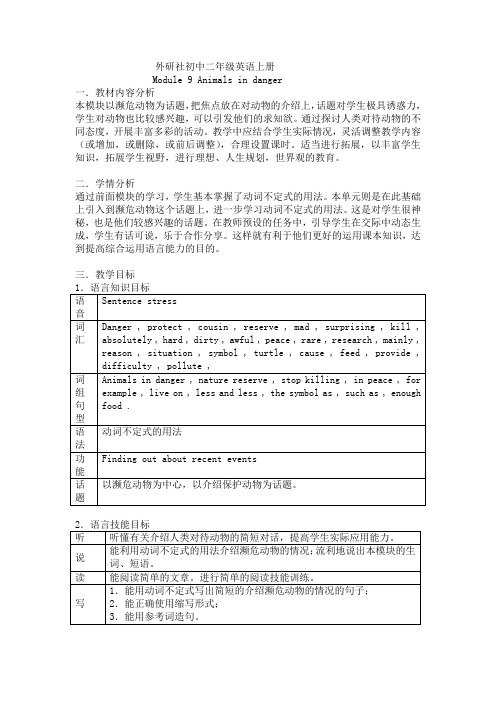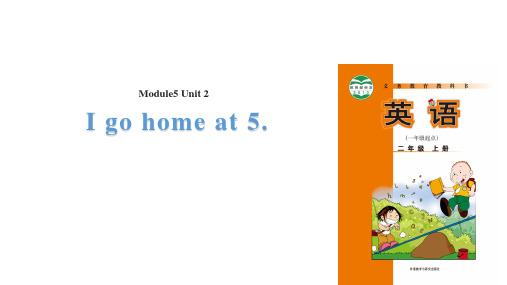外研社英语二年级上册重点句型.pdf
- 格式:pdf
- 大小:13.74 KB
- 文档页数:1




外研社初中二年级英语上册Module 9 Animals in danger一.教材内容分析本模块以濒危动物为话题,把焦点放在对动物的介绍上,话题对学生极具诱惑力,学生对动物也比较感兴趣,可以引发他们的求知欲。
通过探讨人类对待动物的不同态度,开展丰富多彩的活动。
教学中应结合学生实际情况,灵活调整教学内容(或增加,或删除,或前后调整),合理设置课时。
适当进行拓展,以丰富学生知识,拓展学生视野,进行理想、人生规划,世界观的教育。
二.学情分析通过前面模块的学习,学生基本掌握了动词不定式的用法。
本单元则是在此基础上引入到濒危动物这个话题上,进一步学习动词不定式的用法。
这是对学生很神秘,也是他们较感兴趣的话题。
在教师预设的任务中,引导学生在交际中动态生成,学生有话可说,乐于合作分享。
这样就有利于他们更好的运用课本知识,达到提高综合运用语言能力的目的。
三.教学目标4.文化意识目标:在中外对比中,了解最新人类对待动物的情况。
5.情感态度目标培养学生勇于探索大自然奥秘的精神,积极参加英语活动,要克服困难,在新环境中进一步树立正确的语言学习观。
四.重点难点1. 教学重点[1] 重点句型:动词不定式的各种用法。
[2] 重点话题:谈论人类对待濒危动物的情况。
2. 教学难点[1] 掌握动词不定式的各种用法[2] 能用恰当地道的英语介绍。
3. 突破途径以话题为核心,通过个人思考、小组及班级活动等不同途径,在听、说、读、写中使单词及句型以不同的形式反复出现,在足够的输入中,达成有效的语言输出。
五、教材处理1、任务核心任务:能够运用所学句型结构向不同的朋友介绍濒危动物的情况。
三个环节如下:pre-task:学生联系生活实际,激活背景知识。
Task-cycle:通过整个模块的听说读写的训练,强化“对待濒危动物要做的事情”的表达能力,为完成核心任务做好铺垫。
post-task:达成任务,展示成果,自我评价,反馈学习情况。
2、课时安排第一课时:Listening and vocabulary第二课时: Reading and Vocabulary第三课时: Pronunciation and speaking .Writing.第四课时: Language in use 1, 2,3,4,5,6第五课时:Language in use 7,8,9, Around the world, Module task。


外研社英语二年级上册Unit 1: Our schoolIn this unit, we learn about our school. We learn the names of different places in the school, such as the classroom, library, playground, and office. We also learn how to ask and give directions in English.Unit 2: My familyIn this unit, we talk about our families. We learn the names of family members, such as mother, father, brother, and sister. We also learn how to describe our family members using simple adjectives such as tall, short, and friendly.Unit 3: My homeIn this unit, we learn about our homes. We learn the names of different rooms in a house, such as the living room,bedroom, kitchen, and bathroom. We also learn how to talk about the furniture and objects in each room.Unit 4: My friendsIn this unit, we talk about our friends. We learn how to introduce our friends to others and talk about their likes and dislikes. We also learn how to describe our friends using adjectives such as funny, kind, and smart.Unit 5: My dayIn this unit, we learn about daily routines. We learn how to talk about the things we do in the morning, afternoon, and evening. We also learn how to tell the time and talk about daily activities using verbs such as eat, sleep, play, and study.Unit 6: My clothesIn this unit, we learn about different types of clothing. We learn the names of clothes such as t-shirt, pants, dress,and shoes. We also learn how to describe the colors and patterns of our clothes.。
外研社英语二年级上册Unit 1 Hello!In this unit, we learned how to greet people andintroduce ourselves in English. We practiced phrases like "Hello, I'm Amy" and "What's your name?" We also learned howto say "goodbye" and "thank you". We listened to Englishsongs and learned how to sing "Hello, Hello, What's your name?"Unit 2 My FamilyIn this unit, we talked about our families. We learnedhow to say "This is my mother" and "That is my father" in English. We also learned the names of different family members such as grandmother, grandfather, brother, and sister. We drew pictures of our families and presented them to the class in English.Unit 3 NumbersIn this unit, we learned how to count from 1 to 20 in English. We practiced saying the numbers out loud and writing them down. We played games to help us remember the numbers and had a lot of fun doing it. We also learned how to ask "How old are you?" and give our own age in English.Unit 4 ColorsIn this unit, we learned the names of different colors in English. We practiced saying phrases like "This is red" and "That is blue". We also learned how to ask "What color is it?" and answer with the correct color in English. We did coloring activities to help us remember the names of the colors.Unit 5 My SchoolIn this unit, we talked about our school and the things we do there. We learned how to say "This is my school" and "I like my school" in English. We also learned the names ofdifferent subjects like math, English, and science. We described our favorite activities at school in English.。
外研社小学英语二年级上册重点句型
(一) 喜欢和不喜欢句型:(module 1-2)
(1) A:What do you like (你喜欢什么) What does he/she like (他/她喜欢什么)
B:I like jigsaws. (我喜欢拼图) He/She likes bikes.(他/她喜欢自行车)
(2) A:Do you like dolls (你喜欢娃娃吗) B:Yes, I do. /No, I don‘t.
(3) I don’t like this party. (我不喜欢这个聚会)
He/She dosen‘t like these shoes. (他/她不喜欢这双鞋)
(二) have句型:(module 3)
(1) We have English in the morning. (早上我们有英语课)
(2) A:Do you have Maths in the afternoon (下午你有数学课吗) B:Yes, I do. /No, I don’t.
(三) 时间句型:(module 4-5)
(1) A:What‘s the time now (现在几点了)
B:It’s 2 o‘clock. (两点了) 或It’s half past 7. (7点半了)
(2) A:Is it 5 o‘clock (是5点吗)
B:Yes, it is. / No, it isn’t.
(3) I get up at 7 o‘clock in the morning. (我早上7点起床)
I have breakfast at half past 7 in the morning. (我早上7点半吃早饭)
(四) 有关周末活动的句型:(module 6-7)
(1) A:What do you do at the weekend (周末你做什么)
B:I watch TV. (我看电视)
(2) A:Do you play football at the weekend (你周末踢足球吗)
B:Yes, I do. / No, I don’t.
(3) A:Where do you play football (你在哪踢足球)
B:I play at the park. (我在公园踢)
(五) 交通方式句型:(module 8)
(1) A:How do you go to school (你怎么去学校)
B:I go to school by bus.(我乘公共汽车去上学) 或I walk to school. (我步行去学校)
(2) A:How does your father go to work (你爸爸怎么去上班)
B:He goes to work by bike. (他骑自行车去上班)
(3) A:Does Tom go to school by car (Tom乘小汽车去上学吗)
B:Yes, he does. / No, he doesn‘t.
(六) 有关四季的句型:(module 9)
(1) It’s spring/ summer/ autumn/ winter. (2) It‘s warm/ hot/ cool/ cold. (3) We wear jackets.
(七) 有关新年的句型:(module 10)
Happy new year.(新年快乐) Happy Christmas.(圣诞快乐)
We eat dumplings at Chinese new year. (在中国的新年我们吃饺子)